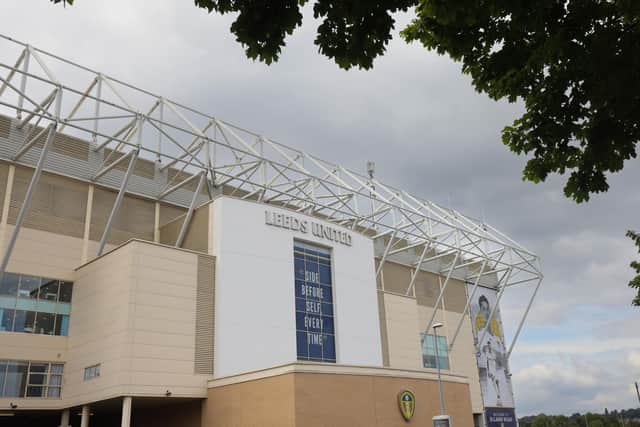Leeds United 49ers Enterprises takeover latest timeline and why EFL green light is still pending
and live on Freeview channel 276
The Whites' incoming owners, a stateside investment group headed up by Paraag Marathe, initially planned to announce the takeover prior to appointing their new manager, but the start of pre-season proved a hard deadline that prompted a change in tack.
Players returned for their medical tests on Monday and on Tuesday Daniel Farke was introduced to supporters as the new man in charge of the 2023/24 promotion bid. On Wednesday Farke met his players at Thorp Arch and took training for the first time.
Advertisement
Hide AdAdvertisement
Hide AdAesthetically speaking, 49ers Enterprises' preferred order of play made sense, not least because Radrizzani remains the legal owner of the club and therefore consultation needs to take place before major decisions are green lit and announced. But it made more sense to have the squad checking back in at Thorp Arch for their first football sessions of the summer, with their boss in situ.
Throughout the past month Leeds have reiterated their confidence that EFL approval would not throw up any insurmountable difficulties. There has always been confidence that the significant parties involved in 49ers Enterprises would pass the football authority's beefed-up 'owners and directors tests' [OADT] and that recruitment plans can be made in the background while outgoing transfer business takes first priority.
But why has EFL approval taken this long, why might it take longer still and what does it involve?
From the outset, any club at the centre of a transition of ownership has a responsibility to inform the EFL through a proposal and then checks can begin to ensure the league's regulations and criteria for who is allowed to own or control a club will be met. Central to all of this is the OADT.
Advertisement
Hide AdAdvertisement
Hide AdControl, in this kind of scenario, relates to a 25 per cent or greater shareholding in a club, and because 49ers Enterprises are moving to 100 per cent ownership at Leeds then everyone of significant involvement must submit to the EFL's test. Some, like Marathe, who was appointed to the board at Elland Road in 2018, have already passed the test, but 49ers Enterprises has since added new investors to finance a full takeover and build a new ownership regime at Leeds United.


The EFL are out to ensure that their member clubs do not fall into the control of individuals who could present a risk to the club and its future, so they mandate the testing of club directors, directors of associated parent companies, shadow directors and anyone who dishes out orders to directors or can exercise any level of control.
Appendix 3 of the EFL regulations puts it this way: "The intention behind this Appendix 3 is to protect the image and integrity of The League and its competitions, the well-being of the Clubs, and the interests of all of the stakeholders in those Clubs, by preventing anyone who is subject to a ‘Disqualifying Condition’ being involved in or influencing the management or administration of a Club."
The OADT is essentially a self-assessment, taken by owners and directors, to declare that there are no circumstances that would disqualify them.
Advertisement
Hide AdAdvertisement
Hide AdSome such circumstances include the power or ability to influence another EFL or Premier League club, being banned or disqualified from sports administration by a governing body or professional body like the Law Society, breaches of English football betting rules, unspent criminal convictions for various offences, insolvency matters or being disqualified as a company director.
Clubs like Leeds looking to come under new ownership must submit a completed declaration for each person who will hold relevance in terms of control and in some cases, takeovers can be approved more quickly than others simply because the list of relevant people is a short one. At Wigan Athletic, billionaire Mike Danson recently completed a takeover in lightning-quick time, due in part to the fact that just one individual joined the board. That goes some way to explaining why Leeds' change of ownership has not been as swift a process as supporters might have liked.
Besides the OADT, 49ers Enterprises have to demonstrate they can sustain the club financially both in the here and now, and in the future. The source of the wealth, or sources in Leeds' case, has to be evidenced.
Up-to-date financial information, including projected profit and loss accounts, cash flow data and balance sheets covering the season ahead and the following seasons, has to be submitted, so the EFL is satisfied that the proposed owners have access to enough cash to bankroll the club's entire operation.
Advertisement
Hide AdAdvertisement
Hide AdNone of this came as any surprise to Leeds, given that CEO Angus Kinnear and Marathe have been through the process previously, but as previous takeovers at other clubs have proved, it takes time. Even once everything is in the hands of the EFL, the information and data has to be scrutinised and investigated. Only once the EFL is satisfied that their regulations are satisfied, will approval be granted. The YEP understands that no news is imminent ahead of the weekend so, at the very least, the process will move into next week. In the meantime Leeds will press on with their preparations for the new season.